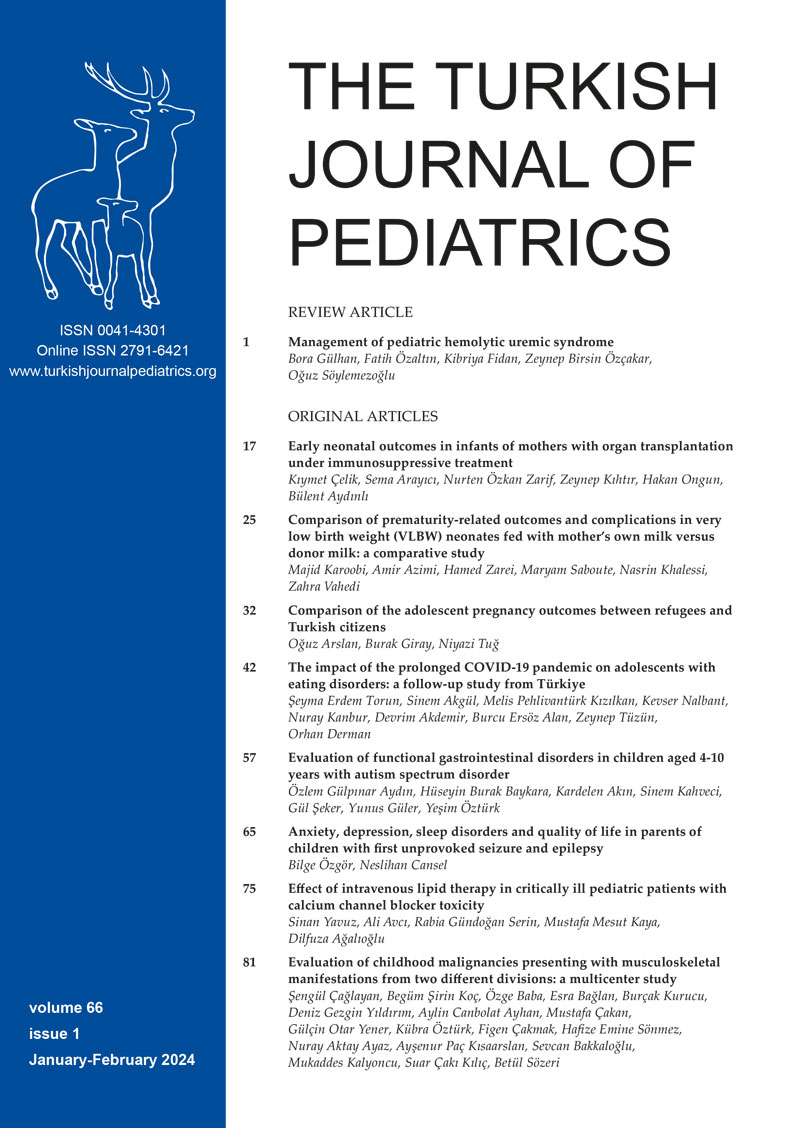Abstract
Background. Overdose with calcium-channel blockers (CCBs) still maintain their importance with a high lethality rate after exposure. We report the intravenous lipid emulsion therapy (ILE) therapy in our CCB overdose patients.
Methods. We retrospectively analyzed the records of 6 patients with CCB intoxication from Batman Training and Research Hospital PICU between March 2021 and September 2022. Patients aged 0-18 years who received ILE treatment for CCB poisoning were included.
Results. All six patients ingested CCB with the intention of committing suicide and were followed up in the pediatric intensive care unit (PICU). All patients received ILE therapy due to hemodynamic instability despite intravenous fluid boluses, calcium, glucagon, insulin-dextrose, and vasoactive agents. Vasoactive-Inotropic Score (VIS) decreased after ILE treatment. All patients were transferred from the PICU after recovery.
Conclusions. ILE therapy should be kept in mind as a salvage therapy in hemodynamically unstable CCB poisoning cases that do not respond to initial and advanced options.
Keywords: calcium channel blockers, lipid emulsion, pediatrics, intoxication
References
- Xiao L, Chen XJ, Feng JK, Li WN, Yuan S, Hu Y. Natural products as the calcium channel blockers for the treatment of arrhythmia: Advance and prospect. Fitoterapia 2023; 169: 105600. https://doi.org/10.1016/j.fitote.2023.105600
- Gummin DD, Mowry JB, Beuhler MC, et al. 2019 Annual report of the American Association of Poison Control Centers’ National Poison Data System (NPDS): 37th annual report. Clin Toxicol (Phila) 2020; 58: 1360-1541. https://doi.org/10.1080/15563650.2020.1834219
- Ranniger C, Roche C. Are one or two dangerous? Calcium channel blocker exposure in toddlers. J Emerg Med 2007; 33: 145-154. https://doi.org/10.1016/j.jemermed.2007.02.010
- Walter E, McKinlay J, Corbett J, Kirk-Bayley J. Review of management in cardiotoxic overdose and efficacy of delayed intralipid use. J Intensive Care Soc 2018; 19: 50-55. https://doi.org/10.1177/1751143717705802
- Weinberg G. Reply to Drs. Goor, Groban, and Butterworth-Lipid Rescue: Caveats and Recommendations for the “Silver Bullet”. Regional Anesthesia & Pain Medicine 2004; 29: 74-75. https://doi.org/10.1016/j.rapm.2003.11.009
- Abernethy DR, Schwartz JB. Calcium-antagonist drugs. N Engl J Med 1999; 341: 1447-1457. https://doi.org/10.1056/nejm199911043411907
- Hao K, Yasuda S. Calcium-channel blockers: an alternative therapy to beta-blockers for myocardial infarction? JACC Asia 2023; 3: 455-456. https://doi.org/10.1016/j.jacasi.2023.04.002
- Graudins A, Lee HM, Druda D. Calcium channel antagonist and beta-blocker overdose: antidotes and adjunct therapies. Br J Clin Pharmacol 2016; 81: 453-461. https://doi.org/10.1111/bcp.12763
- Bathinapatla A, Kanchi S, Chokkareddy R, Puthalapattu RP, Kumar MR. Recent trends in the electrochemical sensors on β- and calcium channel blockers for hypertension and angina pectoris: a comprehensive review. Microchemical Journal 2023; 192: 108930. https://doi.org/10.1016/j.microc.2023.108930
- Stephen VS, Pluymers NA, Gauton SJ. Emergency management of calcium channel blocker overdose. S Afr Med J 2019; 109: 635-638. https://doi.org/10.7196/SAMJ.2019.v109i9.13704
- Li H, Ren Z, Guo ZG. Clinical study of characteristics of acute poisoning caused by calcium channel blockers. Chinese General Practice 2023; 26: 1758-1765. https://doi.org/10.12114/j.issn.1007-9572.2022.0798
- Finn DJ, Stevens J, Tolkacz M, Robinson J, Simpson E, Iacco A. P3: ECMO and calcium channel blocker overdose: a systematic review. ASAIO J 2023; 69(Suppl. 2): 107. https://doi.org/10.1097/01.mat.0000943836.12954.47
- Krohn K, Koletzko B. Parenteral lipid emulsions in paediatrics. Curr Opin Clin Nutr Metab Care 2006; 9: 319-323. https://doi.org/10.1097/01.mco.0000222118.76536.ad
- Assiry MM, Aldayini IAA, Howsawi AA. Lipid emulsion treatment for drug toxicity in pediatric patients. Saudi J Med Pharm Sci 2023; 9: 203-213. https://doi.org/10.36348/sjmps.2023.v09i03.010
- Mazoit JX, Le Guen R, Beloeil H, Benhamou D. Binding of long-lasting local anesthetics to lipid emulsions. Anesthesiology 2009; 110: 380-386. https://doi.org/10.1097/ALN.0b013e318194b252
- Lee SH, Sohn JT. Mechanisms underlying lipid emulsion resuscitation for drug toxicity: a narrative review. Korean J Anesthesiol 2023; 76: 171-182. https://doi.org/10.4097/kja.23031
- Gosselin S, Hoegberg LCG, Hoffman RS, et al. Evidence-based recommendations on the use of intravenous lipid emulsion therapy in poisoning. Clin Toxicol (Phila) 2016; 54: 899-923. https://doi.org/10.1080/15563650.2016.1214275
- Katlan B, Kesici S, Bayrakci B. Intravenous lipid emulsion treatment for calcium-channel blocker intoxication: pediatric case series and review of the literature. Pediatr Emerg Care 2023; 39: 120-124. https://doi.org/10.1097/PEC.0000000000002703
Copyright and license
Copyright © 2024 The Author(s). This is an open access article distributed under the Creative Commons Attribution License (CC BY), which permits unrestricted use, distribution, and reproduction in any medium or format, provided the original work is properly cited.















